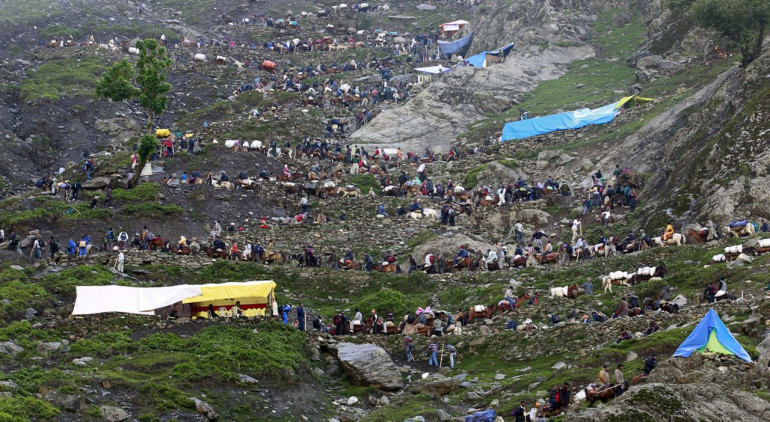
Picture Courtesy : Moneycontrol
The widely condemned attack on Amarnath pilgrims by militants in Kashmir has left many questions unanswered including why security forces failed to secure the route to the pilgrimage site despite specific intelligence inputs that terrorists planned a “sensational” strike to kill 100-150 Hindus and stoke communal unrest in the country.
According to a IANS news report, Muneer Khan, the police chief in the Kashmir Valley long hailed for battling militancy, had in a June 25 note shared an intelligence input received from a south Kashmir police officer that “terrorists have been directed to eliminate 100 to 150 yatris and 100 police officers… which they believe will result in flaring of communal tensions throughout the country”.
Khan had said the input was to be corroborated but did not rule out “the possibility of some sensational attack by terrorist outfits” at a time when thousands of pilgrims daily trek to the cave shrine situated deep in the Himalayas of south Kashmir.
The input was not specific but it warned of exactly what happened in Botengoo village on Monday night. The security forces still failed to act. Why?
The unescorted bus carrying the pilgrims, who came under attack, breached security protocol and moved on the Jammu-Srinagar highway at a time when it was not supposed to.
The attack occurred around 8.30 p.m. As per the security norms, no vehicle carrying Amarnath pilgrims should be allowed to move after 7 in the evening when Quick Response Teams of the security forces withdraw from the highway. The movement at the wrong time made the Gujarat-registered vehicle vulnerable to attack.
How did the bus carrying around 60 pilgrims manage to cross multiple security check-points on the highway without being noticed and stopped from moving on?
All pilgrims and vehicles have to register with the Amarnath shrine board. But the board, which manages the shrine, has denied that the 60 pilgrims and the vehicle they were travelling in were registered for the pilgrimage.
How is it possible that some 60 unregistered pilgrims stay at the north Kashmir Baltal base camp, take the arduous trek to visit the shrine and no one notices them?
According to police, the people who were in the bus had performed the pilgrimage on Saturday and were in Srinagar on Sunday and Monday for sightseeing.
A senior Kashmir police officer told IANS on phone that travel agents usually carry tourists on pilgrimage trips and club it with sightseeing and visits to other resorts in the valley.
“This is not allowed for pilgrims but somehow some people manage to do this. This group appears to be one of them. They returned from the shrine on July 8 and were in Srinagar on July 9 and 10. On Monday evening, they decided to move to Jammu as tourists,” the officer said.
The Jammu and Kashmir government has admitted to security lapses. Deputy Chief Minister Nirmal Singh on Tuesday said the attack needed to be probed.
“Yes, definitely this is a big lapse. We have to enquire why the bus left at 5 p.m., why it was allowed after sunset. We were told there was a tyre burst and the driver took time to replace it,” he said.


















